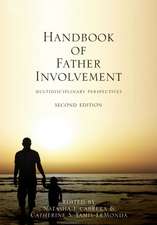Sleep: Critical Concepts in Sociology
Editat de Eric Hsuen Limba Engleză Hardback – 27 sep 2016
Now, this new title from Routledge’s Critical Concepts in Sociology series brings together in one ‘mini library’ the essential groundbreaking and pivotal sociological texts. Furthermore, the development of the sociology of sleep has greatly informed—and been informed by—other academic subjects, such as anthropology, history, and geography. Consequently, the synthetic and cross-disciplinary quality of sleep research is fully reflected in the learned editor’s selection of major works to ensure that the collection will be welcomed by sleep researchers across the social sciences, and beyond.
The first of four volumes covers the intricate theoretical foundations of the sociology of sleep. Volume II, meanwhile, focuses on pioneering sleep research in the social sciences more generally. The third volume features groundbreaking scholarship on the various types of sleep cultures that exist in the contemporary Western world. Finally, Volume IV ventures beyond the Western world to make sense of sleep research that is situated in a multitude of different time periods and social contexts, and to offer an avowedly global perspective.
Supplemented with a full index and the editor’s newly written introductory essay, Sleep is a vital reference tool for established researchers and advanced students alike.
Din seria Critical Concepts in Sociology
- 34%
 Preț: 3963.82 lei
Preț: 3963.82 lei - 34%
 Preț: 6481.94 lei
Preț: 6481.94 lei - 34%
 Preț: 6200.01 lei
Preț: 6200.01 lei - 34%
 Preț: 6465.04 lei
Preț: 6465.04 lei - 36%
 Preț: 8175.58 lei
Preț: 8175.58 lei - 36%
 Preț: 3950.37 lei
Preț: 3950.37 lei - 34%
 Preț: 4376.48 lei
Preț: 4376.48 lei - 34%
 Preț: 4939.66 lei
Preț: 4939.66 lei - 34%
 Preț: 4524.28 lei
Preț: 4524.28 lei - 34%
 Preț: 4388.31 lei
Preț: 4388.31 lei - 34%
 Preț: 3245.93 lei
Preț: 3245.93 lei - 34%
 Preț: 3812.80 lei
Preț: 3812.80 lei - 34%
 Preț: 3816.10 lei
Preț: 3816.10 lei - 36%
 Preț: 4491.53 lei
Preț: 4491.53 lei - 34%
 Preț: 4107.34 lei
Preț: 4107.34 lei - 34%
 Preț: 4235.74 lei
Preț: 4235.74 lei - 34%
 Preț: 6472.62 lei
Preț: 6472.62 lei - 34%
 Preț: 6733.06 lei
Preț: 6733.06 lei - 34%
 Preț: 6732.23 lei
Preț: 6732.23 lei - 34%
 Preț: 1515.73 lei
Preț: 1515.73 lei - 34%
 Preț: 6732.66 lei
Preț: 6732.66 lei - 34%
 Preț: 6136.37 lei
Preț: 6136.37 lei - 34%
 Preț: 6180.92 lei
Preț: 6180.92 lei - 34%
 Preț: 6136.37 lei
Preț: 6136.37 lei - 34%
 Preț: 4516.00 lei
Preț: 4516.00 lei - 18%
 Preț: 5767.94 lei
Preț: 5767.94 lei - 34%
 Preț: 7313.02 lei
Preț: 7313.02 lei - 34%
 Preț: 3694.86 lei
Preț: 3694.86 lei - 34%
 Preț: 6470.22 lei
Preț: 6470.22 lei - 34%
 Preț: 6187.78 lei
Preț: 6187.78 lei - 34%
 Preț: 5487.80 lei
Preț: 5487.80 lei - 34%
 Preț: 6738.36 lei
Preț: 6738.36 lei - 34%
 Preț: 6177.58 lei
Preț: 6177.58 lei
Preț: 6184.11 lei
Preț vechi: 9364.17 lei
-34% Nou
Puncte Express: 9276
Preț estimativ în valută:
1183.39€ • 1244.35$ • 977.78£
1183.39€ • 1244.35$ • 977.78£
Carte tipărită la comandă
Livrare economică 16-30 aprilie
Preluare comenzi: 021 569.72.76
Specificații
ISBN-13: 9781138848214
ISBN-10: 1138848212
Pagini: 1724
Ilustrații: 74
Dimensiuni: 156 x 234 mm
Greutate: 3.11 kg
Ediția:1
Editura: Taylor & Francis
Colecția Routledge
Seria Critical Concepts in Sociology
Locul publicării:Oxford, United Kingdom
ISBN-10: 1138848212
Pagini: 1724
Ilustrații: 74
Dimensiuni: 156 x 234 mm
Greutate: 3.11 kg
Ediția:1
Editura: Taylor & Francis
Colecția Routledge
Seria Critical Concepts in Sociology
Locul publicării:Oxford, United Kingdom
Public țintă
Postgraduate and UndergraduateCuprins
SOCIAL THEORY
Part 1: The Sociological Case for Studying Sleep
Part 1: The Sociological Case for Studying Sleep
- V. Aubert and H. White, 'Sleep: A Sociological Interpretation I', Acta Sociologica, 4, 2, 1959a, pp. 46-54.
- V. Aubert and H. White, 'Sleep: A Sociological Interpretation II', Acta Sociologica, 4, 3, 1959b, pp. 1-16.
- M. Mauss, 'Techniques of the Body', Economy and Society, 2, 1, 1973, pp. 70-88.
- B. Schwartz, 'Notes on the Sociology of Sleep', The Sociological Quarterly, 11, 4, 1970, pp. 485-99.
- B. Taylor, 'Unconsciousness and Society: The Sociology of Sleep', International Journal of Politics and Culture, 6, 3, 1993, pp. 463–71.
- S. J. Williams and G. Bendelow, ‘The Dormant Body’, in The Lived Body: Sociological Themes, Embodied Issues, (London and New York: Routledge, 1998), pp. 171-187.
- S. J. Williams, 'Sleep and Health: Sociological Reflections on the Dormant Society', Health, 6, 2, 2002, pp. 173-200.
- S. J. Williams, 'The Sociological Significance of Sleep: Progress, Problems and Prospects', Sociology Compass, 2, 2, 2008, pp. 639-53.
- S. J. Williams, and N. Crossley, 'Introduction: Sleeping Bodies', Body and Society, 14, 4, 2008, pp. 1-13.Part 2: Sleep Research Across the Social Sciences
- S. Pile, 'Space and the Politics of Sleep', Environment and Planning D: Society and Space, 15, 2, 1997, pp. 128-34.
- P. Kraftl, and J. Horton, 'Spaces of Every-Night Life: For Geographies of Sleep, Sleeping and Sleepiness', Progress in Human Geography, 32, 4, 2008, pp. 509-524.
- P. Harrison, 'In the Absence of Practice', Environment and Planning D: Society and Space, 27, 6, 2009, pp. 987-1009.
- C. M. Worthman, and M. K. Melby, 'Toward a Comparative Developmental Ecology of Human Sleep', in M. Carskadon (ed.), Adolescent Sleep Patterns: Biological, Social, and Psychological Influences (New York: Cambridge University Press, 2002), pp. 69-117.
- R. A. Shweder, L. A. Jensen, and W. M. Goldstein, 'Who Sleeps by Whom Revisited: A Method for Extracting the Moral Goods Implicit in Practice', New Directions for Child and Adolescent Development, 67, 1995, pp. 21-39.
- D. Aliakseyeu, et al., 'Exploring Interaction Strategies in the Context of Sleep', in P. Campos, et al. (eds.), Human-Computer Interaction–Interact 2011 (London: Springer, 2011), pp. 19-36.
- J. E. Biddle and D. S. Hamermesh, 'Sleep and the Allocation of Time', Journal of Political Economy, 98, 5, 1990, pp. 922-43.
- J. Rose, '"On Not Being Able to Sleep": Rereading: The Interpretation of Dreams', in On Not Being Able to Sleep: Psychoanalysis and the Modern World (Princeton: Princeton University Press), pp. 105-124.
VOLUME 2: PIONEERING SLEEP RESEARCH
Part 1: The Sociological Implications of Sleep - R. Meadows, 'The ‘Negotiated Night’: An Embodied Conceptual Framework for the Sociological Study of Sleep', The Sociological Review, 53, 2, 2005, pp. 240-54.
- B. Steger and L. Brunt, 'Introduction: Into the Night and the World of Sleep', in B. Steger and L. Brunt (eds.), Night-Time and Sleep in Asian and the West (London: RoutledgeCurzon, 2003), pp. 1-23.
- E. Van Dongen, 'Anthropology on Beds: The Bed as the Field of Research', Anthropology Today, 23, 6, 2007, pp. 23-6.
- D. Bissell, 'Travelling Vulnerabilities: Mobile Timespaces of Quiescence', Cultural Geographies, 16, 4, 2009, pp. 427-45.
- K. Nairn, 'What Has the Geography of Sleeping Arrangements Got to Do with the Geography of Our Teaching Spaces?', Gender, Place & Culture: A Journal of Feminist Geography, 10, 1, 2003, pp. 67-81.
- P. Rensen, 'Sleep without a Home: The Embedment of Sleep in the Lives of the Rough-Sleeping Homeless in Amsterdam', in B. Steger and L. Brunt (eds.), Night-Time and Sleep in Asia and the West (London: RoutledgeCurzon, 2003), pp. 87-107.
- A. Valtonen and S. Veijola, 'Sleep in Tourism', Annals of Tourism Research, 38, 1, 2011, pp. 175-92.
- S. J. Williams, 'Introduction', in The Politics of Sleep: Governing (Un)consciousness in the Late Modern Age (New York: Palgrave Macmillan, 2011), pp. x-xxiii.
- J. Moran-Ellis and S. Venn, 'The Sleeping Lives of Children and Teenagers: Night-Worlds and Arenas of Action', Sociological Research Online, 12, 5, 2007, <http://www.socresonline.org.uk/12/5/9.html>.
- S. J. Williams, 'The Social Etiquette of Sleep: Some Sociological Reflections and Observations', Sociology, 41, 2, 2007a, pp. 313-328.Part 2: Methodological Advancements and Challenges
- J. Hislop, et al., 'Narratives of the Night: The Use of Audio Diaries in Researching Sleep', Sociological Research Online, 10, 4, 2005, <http://www.socresonline.org.uk/10/4/hislop.html>.
- S. J. Williams, 'Vulnerable/Dangerous Bodies? The Trials and Tribulations of Sleep', The Sociological Review, 55, 2007b, pp. 142-155.
- D. Leder, 'The Recessive Body' in The Absent Body (Chicago: The University of Chicago Press, 1990), pp. 36-68.
- S. J. Williams, P. Lowe, and F. Griffiths, 'Embodying and Embedding Children's Sleep: Some Sociological Comments and Observations', Sociological Research Online, 12, 5, 2007, <http://www.socresonline.org.uk/12/5/6.html>.
- R. Meadows, et al., 'Exploring the Interdependence of Couples' Rest-Wake Cycles: An Actigraphic Study', Chronobiology International, 26, 1, 2009, pp. 80-92.
- P. Ashmore, 'Bedtime Material: Recording Becoming Asleep', Area, 43, 2, 2010, pp. 211-217.
- L. Hale, 'Who Has Time to Sleep?', Journal of Public Health, 27, 2, 2005, pp. 205-211.
- J. Pahl, 'Power, Ideology and Resources within Families: A Theoretical Context for Empirical Research on Sleep', Sociological Research Online, 12, 5, 2007, <http://www.socresonline.org.uk/12/5/12.html>.
- E. Fairhurst, 'Theorising Sleep Practices and Later Life: Moving to Sheltered Housing', Sociological Research Online, 12, 5, 2007, <http://www.socresonline.org.uk/12/5/10.html>.
- D. L. Steinberg, 'Reading Sleep through Sleep Fiction: The Parable of Beggars and Choosers', Body and Society, 14, 4, 2008, pp. 115-35.
VOLUME 3: CONTEMPORARY SLEEP CULTURES
Part 1: The Medicalization of Sleep and Beyond - S. Kroll-Smith, 'Popular Media and 'Excessive Daytime Sleepiness': A Study of Rhetorical Authority in Medical Sociology', Sociology of Health and Illness, 25, 6, 2003, pp. 625-643.
- J. Gabe and M. Bury, 'Halcion Nights: A Sociological Account of a Medical Controversy', Sociology, 30, 3, 1996, pp. 447-469.
- S. J. Williams, et al., 'Waking up to Sleepiness: Modafinil, the Media and the Pharmaceuticalisation of Everyday/Night Life', Sociology of Health and Illness, 30, 6, 2008, pp. 839-855.
- M. Wolf-Meyer, 'Natural Hegemonies', Current Anthropology, 52, 6, 2011, pp. 876-895.
- J. Hislop and S. Arber, 'Understanding Women's Sleep Management: Beyond Medicalization-Healthicization?', Sociology of Health and Illness, 25, 7, 2003a, pp. 815-37.
- S. J. Williams, 'Beyond Medicalization-Healthicization? A Rejoinder to Hislop and Arber', Sociology of Health & Illness, 26, 4, 2004, pp. 453-459.
- C. Seale, et al., 'Media Constructions of Sleep and Sleep Disorders: A Study of Uk National Newspapers', Social Science and Medicine, 65, 3, 2007, pp. 418-430.Part 2: Gender and Sexuality
- J. Hislop, and S. Arber, 'Sleepers Wake! The Gendered Nature of Sleep Disruption among Mid-Life Women', Sociology, 37, 4, 2003b, pp. 695-711.
- S. Venn, et al., 'The Fourth Shift: Exploring the Gendered Nature of Sleep Disruption among Couples with Children', The British Journal of Sociology, 59, 1, 2008, pp. 79-98.
- S. Venn, '"It's Okay for a Man to Snore": The Influence of Gender on Sleep Disruption in Couples', Sociological Research Online, 12, 5, 2007, <http://www.socresonline.org.uk/12/5/1.html>.
- D. J. Maume, R. A. Sebastian, and A. R. Bardo, 'Gender, Work-Family Responsibilities, and Sleep', Gender & Society, 24, 6, 2010, pp. 746-768.
- R. Meadows, et al., 'Engaging with Sleep: Male Definitions, Understandings and Attitudes', Sociology of Health and Illness, 30, 5, 2008a, pp. 696-710.
- J. Hislop, 'A Bed of Roses or a Bed of Thorns? Negotiation the Couple Relationship through Sleep', Sociological Research Online, 12, 5, 2007, <http://www.socresonline.org.uk/12/5/2.html>.
- P. Lowe, C. Humphreys, and S. J. Williams, 'Night Terrors: Women's Experiences of (Not) Sleeping Where There Is Domestic Violence', Violence Against Women, 13, 6, 2007b, pp. 549-61.Part 3: Sleep Across the Lifecourse
- J. Owens, 'Sleep in Children: Cross‐Cultural Perspectives', Sleep and Biological Rhythms, 2, 3, 2004, pp. 165-173.
- J. Rowe, 'A Room of Their Own: The Social Landscape of Infant Sleep', Nursing Inquiry, 10, 3, 2003, pp. 184-192.
- S. Venn, and S. Arber, 'Conflicting Sleep Demands: Parents and Young People in Uk Households', in L. Brunt and B. Steger (eds.), Worlds of Sleep (Berlin: Frank & Timme, 2008), pp. 105-30.
- W. Martin, and H. Bartlett, 'The Social Significance of Sleep for Older People with Dementia in the Context of Care', Sociological Research Online, 12, 5, 2007, <http://www.socresonline.org.uk/12/5/11.html>.
- S. Venn, and S. Arber, 'Day-Time Sleep and Active Ageing in Later Life', Ageing and Society, 31, 2, 2011, pp. 197-216.Part 4: Work, Consumption, and Sleep
- V. Baxter, and S. Kroll-Smith, 'Normalizing the Workplace Nap: Blurring the Boundaries between Public and Private Space and Time', Current Sociology, 53, 1, 2005, pp. 33-55.
- M. Brown, 'Taking Care of Business: Self-Help and Sleep Medicine in American Corporate Culture', Journal of Medical Humanities, 25, 3, 2004, pp. 173-87.
- P. Hancock, S. J. Williams, and S. Boden, 'Managing Sleep? The Colonization of Everyday/Night Life', in P. Hancock and M. Tyler (eds.), The Management of Everyday Life (New York: Palgrave Macmillan, 2009), pp. 74-91.
- A. Pugh, 'Sleep in a Sleepless Age: A Sociology of Sleep, Work and Family', in E. Balka and R. Smith (eds.), Women, Work and Computerization: Charting a Course to the Future (Boston: Kluwer Academic Publishers, 2000), pp. 260-267.
- S. J. Williams, and S. Boden, 'Consumed with Sleep? Dormant Bodies in Consumer Culture', Sociological Research Online, 9, 2, 2004, <http://www.socresonline.org.uk/9/2/williams.html>.
VOLUME 4: SLEEP ACROSS THE WORLD AND AGES
Part 1: The History and Future of Sleep - R. Ekirch, 'Sleep We Have Lost: Pre-Industrial Slumber in the British Isles', The American Historical Review, 106, 2, 2001, pp. 343-86.
- S. J. Williams, 'Sleep Through the Centuries: Historical Patterns and Practices', in Sleep and Society: Sociological Ventures into the (Un)known (London and New York: Routledge, 2005), pp. 37-66.
- M. J. Thorpy, 'History of Sleep and Man', in M. J. Thorpy and J. Yager (eds.), Encyclopedia of Sleep and Sleep Disorders (New York: Facts on File, 2001), pp. ix-xxx.
- P. Stearns, P. Rowland, and L. Giarnella, 'Children's Sleep: Sketching Historical Change', Journal of Social History, 30, 2, 1996, pp. 345-66.
- T. Crook, 'Norms, Forms and Beds: Spatializing Sleep in Victorian Britain', Body and Society, 14, 4, 2008, pp. 15-35.
- N. Elias, 'On Behaviour in the Bedroom', in The Civilizing Process: Sociogenic and Psychogenic Investigations (Malden: Blackwell, 2000 [originally published ]), pp. 136-142.
- E. Summers-Bremner, 'Sleeplessness in the Ancient World', in Insomnia: A Cultural History (London: Reaktion, 2008), pp. 14-34.
- E. L. Hsu, 'The Sociology of Sleep and the Measure of Social Acceleration', Time and Society, 23, 2, 2014, pp. 212-234.
- M. Melbin, 'Night as Frontier', American Sociological Review, 43, 1, 1978, pp. 3-22.
- M. Melbin, 'Future Times', in Night as Frontier: Colonizing the World after Dark (New York: Free Press, 1987), pp. 128-136.
- J. Crary, 'Chapter 1', in 24/7: Late Capitalism and the Ends of Sleep (London: Verso, 2013), pp. 1-28.Part 2: Sleep Beyond the Western World
- B. Steger, 'Getting Away with Sleep. Social and Cultural Aspects of Dozing in Parliament', Social Science Japan Journal, 6, 2, 2003, pp. 181-197.
- D. A. Tahhan, 'Depth and Space in Sleep: Intimacy, Touch and the Body in Japanese Co-Sleeping Rituals', Body and Society, 14, 4, 2008, pp. 37-56.
- Y. Li, 'Discourse of Mid-Day Napping: A Political Windsock in Contemporary China', in B. Steger and L. Brunt (eds.), Night-Time and Sleep in Asia and the West (London: RoutledgeCurzon, 2003), pp. 45-64.
- S. R. Adler, 'Consistencies: Cross-Cultural Patterns', in Sleep Paralysis: Night-mares, Nocebos, and the Mind-Body Connection (New Brunswick: Rutgers University Press, 2011), pp. 8-36.
- C. M. Worthman, and R. A. Brown, 'Companionable Sleep: Social Regulation of Sleep and Cosleeping in Egyptian Families', Journal of Family Psychology, 21, 1, 2007, pp. 124-135.
- Y. Musharbash, 'Night, Sight, and Feeling Safe: An Exploration of Aspects of Warlpiri and Western Sleep', The Australian Journal of Anthropology, 24, 1, 2013, pp. 48-63.
Descriere
Once operating in relative obscurity, the sociological study of sleep has become a flourishing area of scholarly research generating unique insights into the ways in which sleep is socially negotiated, influenced, and organized. This new title brings together the essential groundbreaking and pivotal sociological texts. Furthermore, the development of the sociology of sleep has greatly informed—and been informed by—other academic subjects. Consequently, the synthetic and cross-disciplinary quality of sleep research is fully reflected in the learned editor’s selection of major works to ensure that the collection will be welcomed by sleep researchers across the social sciences, and beyond.













